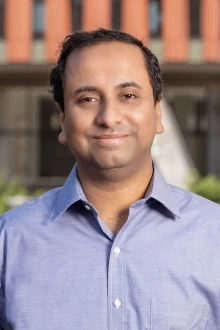Chatterjee awarded inaugural 30 in Their 30s award
Arka Chatterjee, MD, FACC, FSCAI, an associate professor in the University of Arizona College of Medicine – Tucson and a member of the Sarver Heart Center, was awarded an inaugural 30 in Their 30s award by the Society for Cardiovascular Angiography and Interventions.
The SCAI website states that the new award was created for early-career members and “recognizes the best and brightest young professionals in interventional cardiology.”

Arka Chatterjee, MD, FACC, FSCAI
Chatterjee is the principal investigator for multiple device-based clinical trials. “These are important investigations for new devices or new indications for existing devices and have the potential new treatments for patients with big heart attacks and heart failure patients. I am grateful to the Sarver heart center for having a robust clinical trial support system” he said.
Chatterjee joined the faculty of the College of Medicine – Tucson three years ago and has been a fellow of SCAI since 2016. He earned his medical degree from the University of Delhi, India, followed by a residency at the University of Louisville and fellowships in cardiology and interventional cardiology/structural heart interventions at the University of Alabama at Birmingham.
“Dr. Chatterjee is extremely strong academically and talented in the catheterization laboratory, and at the same time very humble and collaborative,” said Deepak Acharya, MD, MSPH, an associate professor in the College of Medicine – Tucson and program director for the Interventional Cardiology Fellowship. “He clearly deserves this honor.”
Chatterjee said he was drawn to cardiology because, “the ability to impact someone’s life within the course of a few minutes was hugely appealing. Whether it is a heart attack that we try to abort, or a bad heart rhythm that we get a patient out of, there is a sense of achievement,” he said. “This is what initially drew me to cardiology.”
The SCAI, founded in 1978, is nonprofit medical society representing invasive and interventional cardiologists. According to the SCAI website, their “mission is to lead the global interventional cardiovascular community through education, advocacy, research and quality patient care.”

